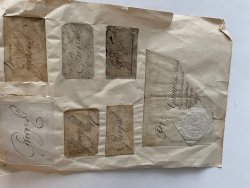
[King George III.] Seven examples of the king's signature on a page, six of them cut from parchment documents, the last two made while insane, with the last on a fragment of a warrant.
See image. It is hard to see how this collection could be bettered, the range of signatures from sanity to madness being of particular interest. All seven examples laid down on a folio leaf extracted from an album. The leaf is in poor condition, creased and with closed tears, but the parchment and paper bearing the signatures themselves in good condition, the six parchment items having the usual discoloration, but the example on paper in excellent condition. Six of the signatures (on rectangles ranging in size from 10 x 7 cm to 8 x 5 cm) are arranged in two columns of three items each, and beneath this arrangement, across the foot of the page, is the irregular fragment cut from the top left-hand corner of a warrant, 16cm at its widest and 12.5 cm at its longest. The largest and clearest of the six signatures above the warrant is the one at top left, which is on paper. Here the ‘George R.’ is neatly, boldly and stylishly written. The signature beside this, at the head of the right-hand column, is the one which has been neatly annotated with the date: it is somewhat faded and has been laid down upside down. The signature at the bottom of the right-hand column has clearly been written while insane or blind. The warrant has a similarly afflicted signature at top right, and beneath this is the king’s circular seal (4cm in diameter), with the crest of the United Kingdom, on the customary diamond of paper, 6 cm square, laid over the red wax. The surviving text, a mixture of printed and manuscript (the latter given in square brackets below), reads: ‘George the Third [...] / Great Britain an[d] [...] / [and Wellbelo[ved]] [...] / We do by the [...] / here of [...] / L[...] / G[...]’.


